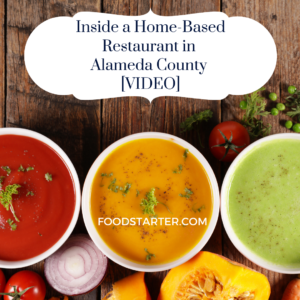In Septemeber of 2019, Nancy Chang contacted me to ask how to get her soup business started.
She explained: “We are creating nutritionally dense and herbal teas for people who are recovering from treatment for cancer in Oakland and delivering to them starting in the East Bay. This concept has been a passion and purpose for me to bring into the world ever since my mom passed away from leukemia…”
At the time, Nancy’s only option for running a soup business in Oakland — which is in Alameda County — was to produce the soup in a commercial kitchen. Or hire a contract manufacturer to make the soup for her.
I mentioned the Cook Alliance and their tireless work to evangelize the Micro-Enterprise Home Kitchen Operator law (MEHKO), which had not yet been approved in any counties in California.
This law would enable home-based restaurants to serve and personally deliver meals to diners — as opposed to the Homemade Food / Cottage Food law which is for packaged, shelf-stable foods. (Compare the two laws.)
Fast forward 2 years: Nancy is in business with the flexibility to make soup out of her apartment in Oakland, all without the overhead of a commercial kitchen.
Home-based restaurants are just getting started in California.
The first home-based restaurant opened in Riverside, which was the first county in California to approve the law; Governor Brown had approved the law with the caveat that each county had to create the rules and either allow the law to take effect or not.
Alameda County, where Oakland and Berkeley are located, approved the MEHKO law in 2021.
What are basic home and kitchen requirements for a home-based restaurant / MEHKO ?
Before embarking on a remodel or even buying a house, check out the requirements for home-based food businesses in your California county. Many counties have not yet made it legal to run these businesses, so be sure to check!
You might be surprised at how basic and intuitive the requirements are.
The basic gist is safe, clean, orderly, and separate from your personal life (and pets).
Check out Alameda County cottage food and home-based restaurant guidelines for example.
“In order to obtain approval as a MEHKO, the residential home will be evaluated to ensure that the proposed food operation can be conducted in a manner that safeguards public health.”
This checklist is simple, straighforward, and everything you’d want to see in a commercial restaurant.
It only makes sense that these basic guidelines are applied to home restaurants:
 Adequate food production and food storage capacity for the proposed menu or food products to be prepared. You’ll want to separate this food from your household food.
Adequate food production and food storage capacity for the proposed menu or food products to be prepared. You’ll want to separate this food from your household food.- Adequate equipment to keep cold foods cold (41°F) and hot foods hot (135°F) during storage or transportation (if required).
- Adequate dry food storage and utensil/equipment storage. As you can see in the video, metal racks achieve their purpose perfectly as would freestanding cabinets or closed containers.
- • Equipment and utensils that will be used as part of the MEHKO operation must be in good repair.
- A fully operable kitchen sink with hot and cold water for cleaning and sanitizing purposes. Yes.
- Restroom handwashing sink must be supplied with warm water, soap and paper towels. YES.
- “Toilet room” (which pretty much everyone else calls a bathroom) is supplied with toilet paper and is working properly. We won’t even go there.
- Appropriate lighting is available in the food preparation area. You want to see any foreign objects before they make their way into the food.
- Adequate ventilation that allows gases, odors, steam, heat, grease, vapors, and smoke to escape the kitchen (based on proposed menu). You’ll want this for your own sake too!
- Floors, walls, ceilings, in kitchen and toilet facility are smooth, of durable construction and easily cleanable. There’s that “toilet facility” phrase again.
Before you start a home-based food business, make a plan.
While it’s much cheaper to base a food business out of your house than renting commercial space and get licensed for mass production, there are still lots of considerations before leaping in.
Nancy had made a full-on business plan through the Renaissance Entrepreneurship Center.
Even a basic business plan outlining your “why” (mission), goals, who you’re serving, how you will get the word out, what your menu will be, how you’re different from the competition etc. will be a great help. (My book Good Food, Great Business has lots more tips on business planning although it’s more for packaged food entrepreneurs.)
Renting? It’s a best practice to confirm with your landlord that it’s OK to run your business out of your rental. After all, you don’t want trouble once you’re up and running…and a smashing success!
Shopping for a house to buy and really want to run a home-based restaurant? Definitely check the counties’ laws…or ask me and I will help you do so as a real estate agent!
What to do next? Read the FAQ from Cook Alliance in English and Espanol.
You can read more about Purpose & Hope’s home-based soup business on Berkeleyside.
If you’re thinking of buying a house where you will run a home-based restaurant, let’s chat!






